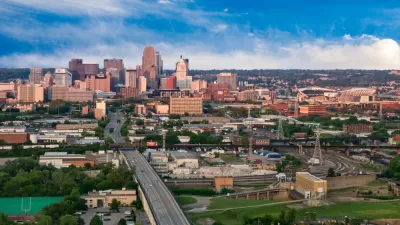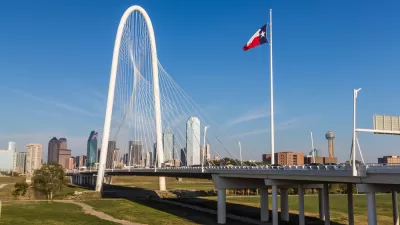For serious transportation policy wonks lately every day is like Christmas. Climate change, bailout, deteriorating infrastructure, reauthorization, aging baby boomers, bailout, stimulus, new administration, economic development, global competition, urban redevelopment, bailout, etc. One has all they can do to just keep up with all the relevant news and positioning say nothing of understanding it. In fact, I don’t understand it.
For serious transportation policy wonks lately every day is like Christmas. Climate change, bailout, deteriorating infrastructure, reauthorization, aging baby boomers, bailout, stimulus, new administration, economic development, global competition, urban redevelopment, bailout, etc. One has all they can do to just keep up with all the relevant news and positioning say nothing of understanding it. In fact, I don't understand it. I'm particularly perplexed with the decisions that are being made and proposed regarding financial support for various industries and modes. On the surface there is a perception that transportation policy is moving in the direction of favoring more urban and multimodal priorities for transportation, favoring providing travel options, favoring urban development and redevelopment, favoring climate friendly investments, and relying more on performance measures. In reality we seem to be witnessing a series of disjointed, inconsistent and, dare I say, hypocritical and perhaps demagogic decisions and positions:
· Increasing the federal fuel tax is taboo but cap and trade is critical,
· Transportation resource allocation should be performance based across modes but billions are earmarked for high speed (and probably not so high speed) rail,
· Investments should be very efficient - but create lots of jobs,
· We want to reduce vehicle miles of travel but not lose any jobs in the auto and related industries - we take credit for jobs created by investments in one mode without debiting the losses in competing modes.
· We are eager to claim credit for economic development near transportation investments but not to debit the foregone development at locations where we didn't chose to invest.
There is an extensive and controversial body of literature that explores the full direct and externalities/social costs of travel by the various modes. There seems to be some consensus that many of the externalities of travel are not fully reflected in the user paid costs of travel. Now we appear to be moving in the direction of not even having users pay the direct costs of travel – even for auto travel that has traditionally relied on user fees to support the necessary infrastructure. While we wax philosophically about sophisticated GPS technologies that will charge by vehicle type, time of day, and location, we are busy running away from the user fee concept for funding travel. What isn't particularly controversial is that travel behavior responds to pricing signals. Decisions are increasingly insulating travelers from the full cost of the travel choices they make. Vehicle buyers and manufacturers are being subsidized and we are bailing out trust funds with general revenues. In a period of 18 months the amount of Federal funds directed to bailing out the transportation sector is enormous. While there is ever increasing talk of ambitious plans to alter travel behavior and land use there is no stomach for a quarter a gallon user fee increase to fund reauthorization.
Rather than elaborate and unproven strategies to induce altered travel behavior and location decisions why don't we get the pricing signals right first? Is it logical to abhor fuel tax increases as publically intolerable while assuming a far higher travel cost consequence from Cap and Trade is OK? Should we subsidize the ownership of autos through clunker rebates while investing in expensive capital investments to coax folks out of their cars? The direct costs of the roadway system have been able to be comfortably supported by users' fees for decades so now when deficits are at record levels we should use general funds to bail out the highway trust fund?

Given the present federal fuel tax generates approximately 1.80 billion per penny per year, this dump on the next generation could be cleaned up with a nickel tax increase for 14+ years, or 10¢ for 7+ years, or even 72¢ per gallon for one year (still way below the cost of gas in 2008). Should we pay the full cost of these decisions and get the benefit of more realistic cost signals for the traveling public or should we pass these costs on to future generations? Will the public be tolerant of any new revenue proposals now that we have conditioned them to believe they can have everything in the name of stimulus and the next generation will pay?

Just maybe our decisions would be wiser and better informed by the public if the public was subject to at least the direct costs of those decisions.

Alabama: Trump Terminates Settlements for Black Communities Harmed By Raw Sewage
Trump deemed the landmark civil rights agreement “illegal DEI and environmental justice policy.”

Planetizen Federal Action Tracker
A weekly monitor of how Trump’s orders and actions are impacting planners and planning in America.

The 120 Year Old Tiny Home Villages That Sheltered San Francisco’s Earthquake Refugees
More than a century ago, San Francisco mobilized to house thousands of residents displaced by the 1906 earthquake. Could their strategy offer a model for the present?

Ken Jennings Launches Transit Web Series
The Jeopardy champ wants you to ride public transit.

BLM To Rescind Public Lands Rule
The change will downgrade conservation, once again putting federal land at risk for mining and other extractive uses.

Indy Neighborhood Group Builds Temporary Multi-Use Path
Community members, aided in part by funding from the city, repurposed a vehicle lane to create a protected bike and pedestrian path for the summer season.
Urban Design for Planners 1: Software Tools
This six-course series explores essential urban design concepts using open source software and equips planners with the tools they need to participate fully in the urban design process.
Planning for Universal Design
Learn the tools for implementing Universal Design in planning regulations.
Clanton & Associates, Inc.
Jessamine County Fiscal Court
Institute for Housing and Urban Development Studies (IHS)
City of Grandview
Harvard GSD Executive Education
Toledo-Lucas County Plan Commissions
Salt Lake City
NYU Wagner Graduate School of Public Service





























